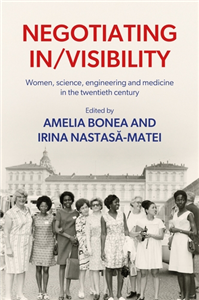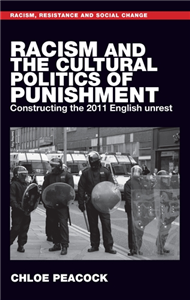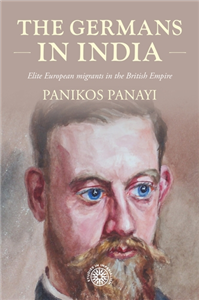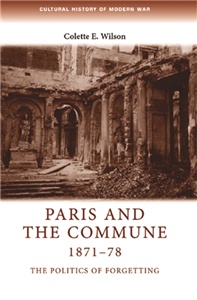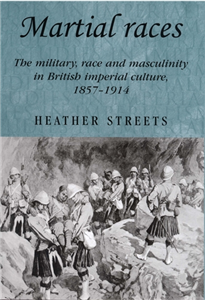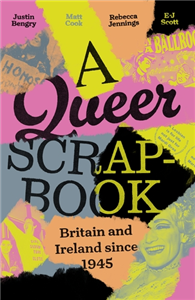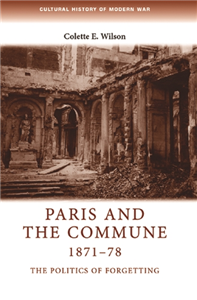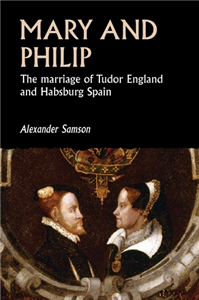Your Search Results
-
Penned in the Margins
Penned in the Margins creates award-winning publications and performances for people who are not afraid to take risks. From modest beginnings as a reading series in a converted railway arch in south London, Penned in the Margins has grown over the last 15 years into an award-winning independent publisher of poetry, fiction, non-fiction and cross genre work. "A marvellously exciting venture, bringing together the worlds of experimentalism and performance, always looking for new ways to present the spoken and written word in a time of artistic flux. The mainstream will, in the future, be redefined and enriched by companies like Penned in the Margins." Ian McMillan, poet and broadcaster
View Rights Portal
-
Promoted ContentHumanities & Social SciencesJuly 2021
The fringes of citizenship
Romani minorities in Europe and civic marginalisation
by Julija Sardelic, Gurminder Bhambra
This book presents a socio-legal enquiry into the civic marginalisation of Roma in Europe. Instead of looking only at Roma's position as migrants, an ethnic minority or a socio-economically disadvantage group, it considers them as European citizens, questioning why they are typically used to describe exceptionalities of citizenship in developed liberal democracies rather than as evidence for how problematic the conceptualisation of citizenship is at its core. Developing novel theoretical concepts, such as the fringes of citizenship and the invisible edges of citizenship, the book investigates a variety of topics around citizenship, including migration and free movement, statelessness and school segregation, as well as how marginalised minorities respond to such predicaments. It argues that while Roma are unique as a minority, the treatment that marginalises them is not. This is demonstrated by comparing their position to that of other marginalised minorities around the globe.
-
Promoted ContentScience & MathematicsAugust 2025
Negotiating in/visibility
Women, science, engineering and medicine in the twentieth century
by Amelia Bonea, Irina Nastasa-Matei
This volume brings together scholars from different disciplinary backgrounds to discuss how women contributed to the making, pedagogy, institutionalisation and communication of scientific knowledge in the twentieth century, and to reflect on the theoretical and methodological challenges of documenting such hidden contributions. Featuring examples from China, former Czechoslovakia, Greece, Hungary, India, Japan, Romania, the United Kingdom and the United States, the contributors discuss women's engagement with science across different institutional and non-institutional sites, ranging from the laboratory and the school to the clinic, the home and the media. The volume moves beyond the professional scientist model to enlarge our understanding of women's participation in twentieth-century science and document the complex combination of factors that rendered such contributions (in)visible to contemporaries and future generations.
-
 Trusted Partner
Geography & the EnvironmentJuly 2026
Trusted Partner
Geography & the EnvironmentJuly 2026Environments of power
Vibrant terrain and landscapes of resistance
by Holly Randell-Moon
Environments of power provides unique case studies of environmental inclusion and exclusion across the Americas, Africa, Japan, India, and the South-Pacific. Using more-than-human and Indigenist approaches, chapters focus on Indigenous environmental resistance, marginalisation across social and physical environments, ecology as art, and how local communities are caught up in and resist development and infrastructure projects. The book demonstrates how environments influence which bodies and other matter belong (or not) in certain places.
-
 Trusted Partner
Humanities & Social SciencesOctober 2024
Trusted Partner
Humanities & Social SciencesOctober 2024Brexit and citizens’ rights
History, policy and experience
by Djordje Sredanovic, Bridget Byrne
The book offers interdisciplinary analyses of the impact of Brexit on the rights of EU27 citizens in the UK, Britons in the UK and the EU, and third-country nationals. It combines a historical examination of citizenship and migration between the UK, Europe and the Commonwealth with the analysis of policies and of the experiences of the different groups impacted by Brexit. The book discusses Brexit within the larger history and dynamics of UK and EU citizenship and migration. The individual chapters look at how Brexit is transforming the citizenship rights of different groups, including issues of loss of citizenship and experiences of naturalisation. They further examine the fears of the groups impacted, and larger issues of belonging, marginalisation, political orientations and mobilisations that cross legal status, nationality, ethnicity, race and class.
-
 Trusted Partner
Art & design styles: BaroqueOctober 2016
Trusted Partner
Art & design styles: BaroqueOctober 2016The matter of miracles
Neapolitan baroque architecture and sanctity
by Series edited by Amelia Jones, Helen Hills, Marsha Meskimmon
This book investigates baroque architecture through the lens of San Gennaro's miraculously liquefying blood in Naples. This vantage point allows a bracing and thoroughly original rethink of the power of baroque relics and reliquaries. It shows how a focus on miracles produces original interpretations of architecture, sanctity and place which will engage architectural historians everywhere. The matter of the baroque miracle extends into a rigorous engagement with natural history, telluric philosophy, new materialism, theory and philosophy. The study will transform our understanding of baroque art and architecture, sanctity and Naples. Bristling with new archival materials and historical insights, this study lifts the baroque from its previous marginalisation to engage fiercely with materiality and potentiality and thus unleash baroque art and architecture as productive and transformational.
-
 Trusted Partner
Humanities & Social SciencesMarch 2026
Trusted Partner
Humanities & Social SciencesMarch 2026Justifying (in)justice
Discourses of crime and punishment in the wake of the 2011 English riots
by Chloe Peacock
Justifying (in)justice reveals how processes of ignorance are vital to legitimising punitive and discriminatory criminal justice policy and practices. Focusing on the state's startlingly harsh response to the English 'riots' of 2011, the book draws together unique insights from interviews with prosecutors, sentencers, defence lawyers and policymakers at the heart of the response, alongside analysis of media and political debates. Peacock explores the forms of unknowing that were mobilised to justify and normalise the harsh and inequitable punishment of the 'rioters', from amnesia about police racism and Britain's long history of unrest, to widespread denial about the violence of the prison system. Looking to recent events in Britain and beyond, the book offers timely insight into the cultural processes underpinning the punitive systems that disproportionately harm marginalised and racially minoritised communities.
-
 Trusted Partner
Business, Economics & LawSeptember 2004
Trusted Partner
Business, Economics & LawSeptember 2004Trade unions and democracy
Strategies and perspectives
by Mark Harcourt, Geoffrey Wood
This book explores the changing role of trade unions as products of, and agents for, democracy. Despite conventionally being portrayed as politically marginalised and in terminal decline, trade unions continue to represent a significant component of society within most industrialised countries and have demonstrated a capacity for revival and renewal in the face of difficult corcumstances. It brings together a distinguished panel of leading and emerging scholars in the field, and provides a critical assessment of the current role of trade unions in society, their capacity to impact on state policies in such a manner as to ensure greater accountability and fairness, and the nature and extent of internal representative democracy within the labour movement. This volume will be of interest to students and academics in industrial relations, critical management studies, political studies and sociology. ;
-
 Trusted Partner
Humanities & Social SciencesMay 2012
Trusted Partner
Humanities & Social SciencesMay 2012Racism and social change in the Republic of Ireland
Second edition
by Bryan Fanning
Now in its second edition, Racism and Social Change in the Republic of Ireland provides an original and challenging account of racism in twenty-first century Irish society and locates this in its historical, political, sociological and policy contexts. It includes specific case studies of the experiences of racism in twenty-first century Ireland alongside a number of historical case studies that examine how modern Ireland came to marginalize ethnic minorities. Various chapters examine responses by the Irish state to Jewish refugees before, during and after the Holocaust, asylum seekers and Travellers. Other chapters examine policy responses to and academic debates on racism in Ireland. A key focus of the various case studies is upon the mechanics of exclusion experienced by black and ethnic minorities within institutional processes and of the linked challenge of taking racism seriously in twenty-first century Ireland. ;
-
 Trusted Partner
Humanities & Social SciencesJune 2025
Trusted Partner
Humanities & Social SciencesJune 2025The Germans in India
Elite European migrants in the British Empire
by Panikos Panayi
Based on years of research in libraries and archives in England, Germany, India and Switzerland, this book offers a new interpretation of global migration from the early nineteenth until the early twentieth century. Rather than focusing upon the mass transatlantic migration or the movement of Britons towards British colonies, it examines the elite German migrants who progressed to India, especially missionaries, scholars and scientists, businessmen and travellers. The story told here questions, for the first time, the concept of Europeans in India. Previous scholarship has ignored any national variations in the presence of white people in India, viewing them either as part of a ruling elite or, more recently, white subalterns. The German elites undermine these conceptions. They developed into distinct groups before 1914, especially in the missionary compound, but faced marginalisation and expulsion during the First World War.
-
 Trusted Partner
Humanities & Social SciencesNovember 2007
Trusted Partner
Humanities & Social SciencesNovember 2007Paris and the Commune 1871–78
The politics of forgetting
by Bertrand Taithe, Colette Wilson, Penny Summerfield, Peter Gatrell, Max Jones, Ana Carden-Coyne
Despite the scholarship and political activism devoted to keeping the memory of the Paris Commune alive, there still remains much ignorance both in France and elsewhere, about the traumatic civil war of 1871; some 20,000 to 35,000 people were killed on the streets of Paris in just the final week of the conflict. Colette Wilson identifies a critical blind-spot in French studies and employs new critical approaches to neglected texts, marginalised aspects of the illustrated press, early photography and a selection of novels by Emile Zola. This book will be of interest to students and academics studying France in the nineteenth century from a number of different perspectives war and revolution studies, cultural studies, history and cultural memory, literature, art history, photography, the illustrated press, city studies and human geography. The book will appeal equally to all lovers of Paris who wish to know and understand more about the city's turbulent past. ;
-
 Trusted Partner
Humanities & Social SciencesNovember 2010
Trusted Partner
Humanities & Social SciencesNovember 2010Martial races
The military, race and masculinity in British imperial culture, 1857–1914
by Heather Streets, Andrew Thompson, John Mackenzie
This book explores how and why Scottish Highlanders, Punjabi Sikhs, and Nepalese Gurkhas became identified as the British Empire's fiercest, most manly soldiers in nineteenth century discourse. As 'martial races' these men were believed to possess a biological or cultural disposition to the racial and masculine qualities necessary for the arts of war. Because of this, they were used as icons to promote recruitment in British and Indian armies - a phenomenon with important social and political effects in India, in Britain, and in the armies of the Empire. Martial races bridges regional studies of South Asia and Britain while straddling the fields of racial theory, masculinity, imperialism, identity politics, and military studies. It challenges the marginalisation of the British Army in histories of Victorian popular culture, and demonstrates the army's enduring impact on the regional cultures of the Highlands, the Punjab and Nepal. This unique study will make fascinating reading for higher level students and experts in imperial history, military history and gender history. ;
-
 Trusted Partner
Humanities & Social SciencesJanuary 2026
Trusted Partner
Humanities & Social SciencesJanuary 2026A queer scrapbook
Britain and Ireland since 1945
by Justin Bengry, Matt Cook, Rebecca Jennings, E-J Scott
A beautifully illustrated compendium of LGBTIQ+ life. A queer scrapbook offers a treasure trove of LGBTIQ+ histories from across Britain and Ireland. Packed with materials, from interviews and newspaper articles to photographs and flyers, the book explores urban, rural and regional queer life since 1945. Commentaries and short essays introduce a changing queer landscape, spotlighting four broad themes: home and family, sex and socialising, arts and culture and politics and activism. The book delves into the meaning and experiences of domesticity and parenting and explores the sometimes unexpected places LGBTIQ+ people met to have fun. It examines the importance of creative work in forming community and identity and shows how people fought injustice and advocated for equal rights. Collecting has been a way for the marginalised to explore and assert identity and community. A queer scrapbook vividly illustrates the diversity of queer and trans lives across the British and Irish isles since the Second World War.
-
 Trusted Partner
Social & cultural historyOctober 2016
Trusted Partner
Social & cultural historyOctober 2016Paris and the Commune 1871–78
The politics of forgetting
by Series edited by Bertrand Taithe, Colette Wilson, Penny Summerfield, Peter Gatrell, Max Jones
Despite the scholarship and political activism devoted to keeping the memory of the Paris Commune alive, there still remains much ignorance both in France and elsewhere, about the traumatic civil war of 1871; some 20,000 to 35,000 people were killed on the streets of Paris in just the final week of the conflict. Colette Wilson identifies a critical blind-spot in French studies and employs new critical approaches to neglected texts, marginalised aspects of the illustrated press, early photography and a selection of novels by Emile Zola. This book will be of interest to students and academics studying France in the nineteenth century from a number of different perspectives war and revolution studies, cultural studies, history and cultural memory, literature, art history, photography, the illustrated press, city studies and human geography. The book will appeal equally to all lovers of Paris who wish to know and understand more about the city's turbulent past.
-
 Trusted Partner
Humanities & Social SciencesFebruary 2025
Trusted Partner
Humanities & Social SciencesFebruary 2025An unorthodox history
British Jews since 1945
by Gavin Schaffer
A bold, new history of British Jewish life since the Second World War. Historian Gavin Schaffer wrestles Jewish history away from the question of what others have thought about Jews, focusing instead on the experiences of Jewish people themselves. Exploring the complexities of inclusion and exclusion, he shines a light on groups that have been marginalised within Jewish history and culture, such as queer Jews, Jews married to non-Jews, Israel-critical Jews and even Messianic Jews, while offering a fresh look at Jewish activism, Jewish religiosity and Zionism. Weaving these stories together, Schaffer argues that there are good reasons to consider Jewish Britons as a unitary whole, even as debates rage about who is entitled to call themselves a Jew. Challenging the idea that British Jewish life is in terminal decline. An unorthodox history demonstrates that Jewish Britain is thriving and that Jewishness is deeply embedded in the country's history and culture.
-
 Trusted Partner
Humanities & Social SciencesApril 2018
Trusted Partner
Humanities & Social SciencesApril 2018Disability in the Industrial Revolution
Physical impairment in British coalmining, 1780–1880
by David M. Turner, Daniel Blackie, Julie Anderson
An electronic version of this book is also available under a Creative Commons (CC-BY-NC-ND) license, thanks to the support of the Wellcome Trust. The Industrial Revolution produced injury, illness and disablement on a large scale and nowhere was this more visible than in coalmining. Disability in the Industrial Revolution sheds new light on the human cost of industrialisation by examining the lives and experiences of those disabled in an industry that was vital to Britain's economic growth. Although it is commonly assumed that industrialisation led to increasing marginalisation of people with impairments from the workforce, disabled mineworkers were expected to return to work wherever possible, and new medical services developed to assist in this endeavour. This book explores the working lives of disabled miners and analyses the medical, welfare and community responses to disablement in the coalfields. It shows how disability affected industrial relations and shaped the class identity of mineworkers. The book will appeal to students and academics interested in disability, occupational health and social history.
-
 Trusted Partner
Humanities & Social SciencesOctober 2021
Trusted Partner
Humanities & Social SciencesOctober 2021Mary and Philip
The marriage of Tudor England and Habsburg Spain
by Alexander Samson
Mary I, eldest daughter of Henry VIII, was Queen of England from 1553 until her death in 1558. For much of this time she ruled alongside her husband, King Philip II of Spain, forming a co-monarchy that put England at the heart of early modern Europe. In this book, Alexander Samson presents a bold reassessment of Mary and Philip's reign, rescuing them from the neglect they have suffered at the hands of generations of historians. The co-monarchy of Mary I and Philip II put England at the heart of early modern Europe. This positive reassessment of their joint reign counters a series of parochial, misogynist and anti-Catholic assumptions, correcting the many myths that have grown up around the marriage and explaining the reasons for its persistent marginalisation in the historiography of sixteenth-century England. Using new archival discoveries and original sources, the book argues for Mary as a great Catholic queen, while fleshing out Philip's important contributions as king of England.
-
 Trusted Partner
The ArtsSeptember 2012
Trusted Partner
The ArtsSeptember 2012Tony Richardson
by Robert Shail, Brian McFarlane, Neil Sinyard
Tony Richardson was a key figure in British cinema of the 1950s and 1960s. Having established himself in the theatre with the first production of John Osborne's landmark play Look Back in Anger, he became a central director in the New Wave, bringing greater realism to British cinema. He went on to make some of the most significant films of the 1960s including the multi Oscar-winning Tom Jones. This detailed and authoritative account of Richardson's career provides a reassessment of his achievements. As well as looking at his best known films, it considers neglected works such as Ned Kelly and Joseph Andrews, illustrating how Richardson remained a champion of the socially marginalised. In mapping out his life and work, from the English Stage Company to his final films in America, Shail re-establishes Richardson's at the front rank of British film directors, confirming his contribution to a period of dynamic change in British culture. ;
-
 Trusted Partner
Literature: history & criticismMarch 2010
Trusted Partner
Literature: history & criticismMarch 2010Reading, writing and the influence of Harold Bloom
by Alan Rawes and Jonathon Shears
Reading, writing and the influence of Harold Bloom takes the work of the world's best-known living literary critic and discovers what it is like to read 'with', 'against' and 'beyond' his ideas. The editors, Alan Rawes and Jonathon Shears, introduce the collection by assessing the impact of Bloom's brand of agonistic criticism on literary critics and its ongoing relevance to a discipline attempting to redefine and settle on its collective goals. Firmly grounded in, though not confined to, Bloom's first specialism of Romantic Studies, the volume contains essays that examine Bloom's debts to high Romanticism, his quarrels with feminism, his resistance to historicism, the tensions with the 'Yale School' and his recent work on Shakespeare and genius. Crucially, chapters are also devoted to putting Bloom's anxiety-themed ratios into practice on the poetry of Wordsworth, Shelley, Keats and D. H. Lawrence, amongst others. The Harold Bloom that emerges from this collection is by turns divisive and unifying, marginalised and central, radical and conservative.
-
 Trusted Partner
Humanities & Social SciencesMarch 2017
Trusted Partner
Humanities & Social SciencesMarch 2017Martial races
The military, race and masculinity in British imperial culture, 1857–1914
by Heather Streets
This book explores how and why Scottish Highlanders, Punjabi Sikhs, and Nepalese Gurkhas became identified as the British Empire's fiercest, most manly soldiers in nineteenth century discourse. As 'martial races' these men were believed to possess a biological or cultural disposition to the racial and masculine qualities necessary for the arts of war. Because of this, they were used as icons to promote recruitment in British and Indian armies - a phenomenon with important social and political effects in India, in Britain, and in the armies of the Empire. Martial Races bridges regional studies of South Asia and Britain while straddling the fields of racial theory, masculinity, imperialism, identity politics, and military studies. Of particular importance is the way it exposes the historical instability of racial categories based on colour and its insistence that historically specific ideologies of masculinity helped form the logic of imperial defence, thus wedding gender theory with military studies in unique ways. Moreover, Martial Races challenges the marginalisation of the British Army in histories of Victorian popular culture, and demonstrates the army's enduring impact on the regional cultures of the Highlands, the Punjab and Nepal. This unique study will make fascinating reading for higher level students and experts in imperial history, military history and gender history.
-
 Trusted Partner
Humanities & Social SciencesMarch 2017
Trusted Partner
Humanities & Social SciencesMarch 2017Rethinking settler colonialism
History and memory in Australia, Canada, Aotearoa New Zealand and South Africa
by Annie Coombes
Rethinking settler colonialism focuses on the long history of contact between indigenous peoples and the white colonial communities who settled in Australia, Aotearoa New Zealand, Canada and South Africa. It interrogates how histories of colonial settlement have been mythologised, narrated and embodied in public culture in the twentieth century (through monuments, exhibitions and images) and charts some of the vociferous challenges to such histories that have emerged over recent years. Despite a shared familiarity with cultural and political institutions, practices and policies amongst the white settler communities, the distinctiveness which marked these constituencies as variously, 'Australian', 'South African', 'Canadian' or 'New Zealander', was fundamentally contingent upon their relationship to and with the various indigenous communities they encountered. In each of these countries these communities were displaced, marginalised and sometimes subjected to attempted genocide through the colonial process. Recently these groups have renewed their claims for greater political representation and autonomy. The essays and artwork in this book insist that an understanding of the political and cultural institutions and practices which shaped settler-colonial societies in the past can provide important insights into how this legacy of unequal rights can be contested in the present. It will be of interest to those studying the effects of colonial powers on indigenous populations, and the legacies of imperial rule in postcolonial societies.





